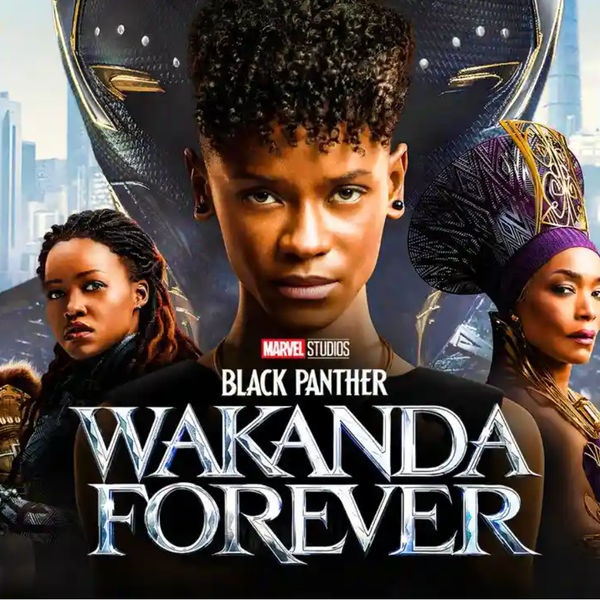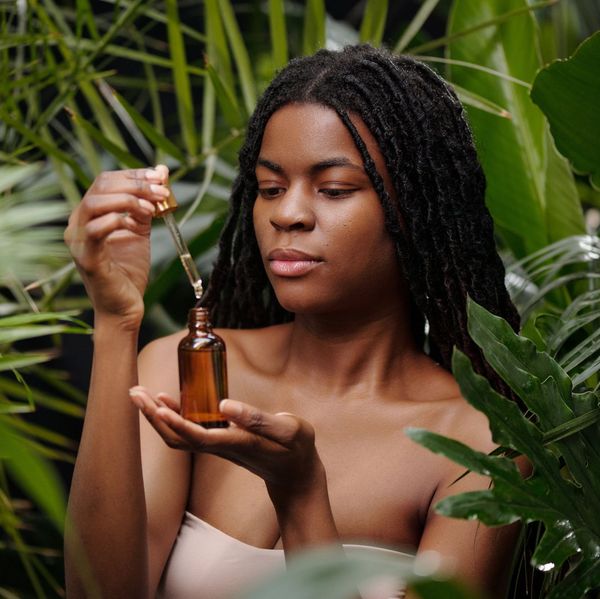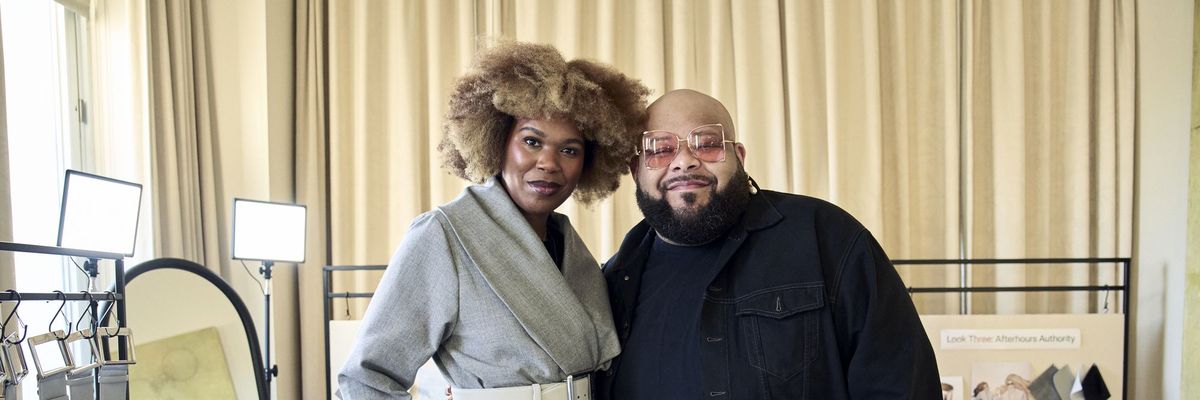'Wakanda Forever' Shows That Black People Can’t Win In The MCU

*Warning: this piece contains spoilers for Black Panther 2: Wakanda Forever*
Wakanda Forever is in a no-win situation.
The sequel to the Marvel Cinematic Universe juggernaut Black Panther has the monumental task of honoring its fallen king, Chadwick Boseman, and the character he played, T’Challa, all while continuing on the Black Panther mantel, introducing new characters Riri “IronHeart” Williams (who will have her own Disney+ series) and the antihero Namor and his underwater kingdom Talokan.
It’s impossible to do all of these things well in just one movie, though co-writer and director Ryan Coogler’s effort is valiant. The love for Boseman is palpable, and Wakanda Forever gives us the opportunity to mourn him together, just as we celebrated him in community during Black Panther’s 2018 run.
Though I left the theater in tears after both Black Panther and Wakanda Forever, back in 2018 I wasn’t immediately sure why. This time around, it’s much more clear what hurts: Black people can’t win in the MCU.
Black People Can’t Have Peace
Much of the Black joy around Black Panther was rooted in the idea of Wakanda as the AfroFuture realized. The most advanced nation in the world, shielded from the evils of white colonization, enslavement, extraction and exploitation of resources, Wakanda represented all the beauty, glory and majesty of who we could’ve been, unshackled and without limits.
And yet, all of its leaders are assassinated by outsiders. First, it’s King T’Chaka, who meets his end at the hands of white Sokovian terrorist Zemo in Captain America: Civil War. Then it’s T’Challa, who’s blipped away for five years by Thanos’ snap in Avengers: Infinity War (before returning back to life in Avengers: End Game and dying of an unnamed illness in Wakanda Forever). Finally, it’s Queen Ramonda (Angela Bassett) in Wakanda Forever, assassinated by Namor (Tenoch Huerta) and left face-down, drowned in a flood of his making. It’s a graphic and disturbing image, not just for the characters – particularly her daughter, Princess Shuri (Letitia Wright), who has now lost every single member of her immediate family – but also for the already-grieving audience.
We came to the film expecting to grieve Boseman, whose untimely death from cancer in 2020 we’ve been processing ever since. And we came expecting to grieve T’Challa, knowing that the #RecastTChalla movement had been unsuccessful because, for the filmmakers and cast, Boseman is more than a character who inspired legions of young people. He was an actual person and friend, deeply loved and deeply grieved by his Black Panther family. Acknowledging his death and honoring him with the film rightfully meant more than continuing on with a new actor in the role. All of that, I'd expected and accepted.
But the assassination of Ramonda was cruel and unnecessary, for both the characters and the audience.
Yes, it’s a fictional death, and Angela Bassett played the hell out of it. But with the death of Boseman, our fictions and our realities have too closely intermingled. Killing Ramonda and leaving Shuri orphaned exemplified our all-too-real experience of Black grief in this country. We can’t even burn our mourning clothes before the next tragedy strikes. To still experience this, even in the AfroFuture? That's cruelty.
But it’s the MCU, and superhero origin stories need cruel deaths. T’Challa’s, apparently, wasn’t enough. Shuri’s subsequent journey of being consumed by grief in Wakanda Forever then, mirrors that of T’Challa’s in Civil War–both of which lead to a dissatisfying end.
Black People Can’t Have Vengeance
In 2016’s Civil War, Boseman’s T’Challa has just witnessed the assassination of his father, King T’Chaka, leading him on a path of revenge, that ultimately ends with him sitting on a hill, having a peaceful chat with his father’s killer, Zemo. T’Challa sees how vengeance has destroyed Zemo and lets the terrorist live, choosing the road of forgiveness.
T’Challa’s insistence on vengeance being no way to live continues in Black Panther and contrasts with his uncle N’Jobu (Sterling K. Brown) and cousin, the Black American N’Jadaka, AKA Erik Killmonger (Michael B. Jordan). N’Jobu, who had been a Wakandan spy in America, had found sympathy for and community with Black American freedom fighters. He married a Black American woman who was imprisoned as a revolutionary (according to a deleted scene) and was planning to use vibranium to break her out and arm Black Americans in their fight against their white supremacist overlords. His own brother T’Chaka finds that plan so offensive that it’s worthy of N’Jobu’s immediate arrest and then execution when he resists, without much discussion, let alone tribunal. T’Chaka’s murder of his brother leaves a young Killmonger without a father or a mother.
All grown up, Killmonger comes to Wakanda for the first time to avenge his father N’Jobu. Killmonger also seeks revenge for Wakanda’s isolationist tactics, watching from the safety of their secret borders as Europeans kidnapped West Africans and sold them into slavery in the Americas, colonized most of Africa, and terrorized Black people globally with white supremacy. His keloided body marks the inner corruption vengeance has left on his soul–and there is no doubt, his murderous, misogynistic tactics are less about liberation for all Black people and more about replicating the white power structure with a Black male face as king.
When Killmonger fights T’Challa to maintain control as Wakanda’s king and Black Panther, T’Challa kills Killmonger. As Killmonger dies, T’Challa offers to heal Killmonger, but he’s just too broken and damaged by the impact of slavery and white supremacy on his people in America, too consumed by vengeance to ever be healed, to ever go back to his African home. Trying to get Black people together to get revenge against white people will never fly in the MCU.
Shuri learns as much in Wakanda Forever when her anger and grief over the loss of T’Challa from an unnamed illness leads Namor to believe she will be a good ally to him and his people, the Talokan, who have also suffered because of white supremacists’ efforts to destroy their people. He asks her to burn the world with him in order to protect their people from further distress. She isn’t keen on it, and she’s also not in control; Ramonda is calling the shots. When Namor murders Ramonda, Shuri goes all in on a plan to destroy Namor and the Talokan.
Her deep-seated need for vengeance leads her to meet Killmonger when she goes to the ancestral plane on her journey to becoming Black Panther. It’s at first a welcomed surprise to see him and to see the film allowing a young, dark-skinned Black woman the fullness of her rage on screen. Seeing Killmonger and watching as her rage sets the ancestral plane ablaze, suggest perhaps we might see Wakanda Forever correct the MCU's constant propaganda that “Black people must forgive our oppressors!” Plot twist: it's the same old story.
“Vengeance has consumed us,” Shuri says after she’s got Namor on the ropes, a spear at his throat. She drops her weapon and her vengeance, for the sake of the Wakandans who are getting their asses kicked in the middle of the ocean by the Talokan. “We cannot let it consume our people.”
Shuri has lost everything and everyone, and even still, Ramonda's spirit randomly shows up as a deus ex machina to remind Shuri that vengeance is not appropriate. "Show him who we are," Ramonda says. What is that, if not the same tired Black respectability politics we’ve been fed since slavery?
Black People Can’t Have Unity
Just like in slavery, unity among Black people is the greatest threat to white supremacist power and has been intentionally thwarted for centuries. It’s no different in the MCU. I accept that Killmonger wasn’t actually radical, and his faux-tep philosophy would not have led to Black liberation, but T’Challa didn’t listen to his partner Nakia’s (Lupita Nyong’o) correct takes on Black unity and liberation either.
Nakia wanted to use vibranium to help the people of Africa, and often left Wakanda to go and help people in other African nations as a spy. Does that inspire T’Challa to do her work at a larger scale at the end of Black Panther? No. He builds a STEM program and community centers for some underprivileged Black kids in America; skips right over the African Union or any attempts to unite and empower the Continent; and incomprehensibly takes his knowledge of vibranium to the white supremacist United Nations instead.
In fact, outside of fictional Wakanda – which appropriates many African nations’ languages and cultures to make up the look and feel of Wakanda – there are zero positive depictions of real Africa in the MCU. In Civil War, we see Nigeria’s capital city Lagos completely destroyed (and mispronounced!! several times!!) by the Avengers. In Black Panther, Nigeria is reduced to Boko Haram traffickers of women and children. In Wakanda Forever, there’s mention of a Wakandan hub in Ghana, but we don’t see Ghana outside of the hub, which is guarded by Dora Milaje. We don’t see any other part of Africa in the MCU, and the message is clear: Wakanda has advanced itself so successfully because it has isolated itself from the rest of Africa. It's giving: "not like the other Blacks."
But the worst offense takes place inside of Wakanda’s borders at the end of Black Panther.
King T’Challa, who was thought dead, has arisen, meaning he was not defeated by Killmonger and the challenge for the throne should continue. But Killmonger has no interest in a fair fight; he’s already been crowned king and Black Panther. Inexplicably, this leads to a Wakandan civil war.
Killmonger just got there like the day before; T’Chaka and T’Challa have been mainstays in Wakanda for decades. W’Kabi (Daniel Kaluuya) is T’Challa’s best friend. All of the tribes joyously celebrated T’Challa being crowned king the week before. And yet, W’Kabi leads his tribe and others into war against fellow Wakandans and many, many are killed, including members of the Dora Milaje. This is the problem of having an all-Black setting in the MCU: action movies need battle scenes, so a lot of Black people will be killed on screen and even Wakanda itself will have to get trashed.
Wakanda is the most technologically advanced nation in the MCU; they’ve never been colonized, and still their ways of handling conflict are steeped in age-old white supremacist tactics of violence, domination and control. The math don’t add!
To make matters more disgusting, Nakia and T’Challa have brought a white CIA agent into Wakanda, Everett Ross, who is not only given life-saving treatment for his injuries and a tour of Wakanda’s secrets as a literal AGENT OF THE CIA, but he's also given weapons by Shuri to shoot down Wakandan pilots in the civil war. The entire reason T’Challa won’t help African nations or the Black diaspora is to protect the safety and security of Wakanda – which completely goes out the window when a random white cop is down bad?
Coogler, Oakland’s own, is very well aware of the history of the CIA, FBI and global police efforts to destroy Black liberation movements, and particularly the Black Panthers. But it’s the MCU; the “good white cop who has Black friends” is their entire MO (see Captain America, Iron Man, Thor…). Still, Agent Ross’s seemingly irrevocable invitation to the Black Panther franchise cookout is an affront and jokingly calling him “colonizer” doesn’t make up for it.
Contrast the Wakandan civil war with the Avengers in Civil War, where the Avengers split into two factions and fight each other. When one Avenger gets seriously injured, the fighting stops. They love each other too much to kill each other. Wakandans – who literally only know each other because they’ve been isolated from the rest of the world for their entire existence – kill each other with ease. What message does that send about Wakanda, about Africa?
Meanwhile, as Black countrymen are killing each other, Zemo, the white man who murdered their king, is still alive and well.
And so are the white French soldiers in Wakanda Forever who attack Wakanda’s hub in Ghana, armed to the teeth and looking for vibranium. The Dora Milaje disarm them and bring them – handcuffed yet unscathed – into a United Nations meeting to help Queen Ramonda make her point about how corrupt these white countries are.
Yet Okoye receives no such leniency from Ramonda when Okoye valiantly loses her fight against a gang of Talokan warriors with superhuman strength who kidnap Shuri and Riri. Ramonda strips Okoye of her rank as general and banishes her from the Dora Milaje, ignoring pleas for mercy from the Council. Ramonda also mentions that Okoye’s “treacherous” husband W’Kabi is in banishment after siding with Killmonger during the civil war.
All of this begs the question: What is justice in Wakanda and how does the most advanced nation on earth dole it out to its own? Murder and banishment and war are all we see.
This continues in Wakanda Forever when Namor approaches Wakanda to team up against white colonizers. I’ll admit, when Namor shows up dripping in vibranium because Wakanda wasn’t in fact the only special place where vibranium formed, I thought, Man…Black people can’t have nothing! Still, I was all for a film exploring the joint struggle of Black and Mayan communities and how we’re naturally allies. But it’s the MCU; Disney would pull the plug on the whole franchise if Marvel actually let Black and Mayan people team up to take down white supremacy for real. So Wakanda Forever spends the majority of its action with the Black and Mayan people killing each other, becoming allies at the very last possible minute, without showing what “allyship” actually looks like. Guess we’ll see what the MCU allows in Black Panther 3.
But as for Wakandan and Black American unity, that future is still to be seen. In Black Panther, Okoye spits the word “Americans,” and with Killmonger’s death and the heartbreaking message that Black American descendants of enslaved Africans might just be too messed up to reconnect with Africa, Black Panther surely makes no space for an end to the Diaspora Wars.
The only other Black Americans in that film are some nameless boys in the ‘hood in Oakland, whom T’Challa attempts to rescue through his charitable STEM program. Get ‘em while they’re young, I guess. But if Black Americans can only receive Wakandan charity rather than exchange of ideas, of cultures, of language, there's no hope for unity.
The inclusion of Riri Williams in Wakanda Forever, however, may be an attempt at correction, as she’s the first Black American young woman character in the franchise. She’s not quite an equal to the Wakandans we know, as she's a 19-year-old college kid. But she is also a prodigy and a mentee for Shuri, and I’m here for their Black girl brilliance and the growing bond between them. But Shuri won't let Riri take her IronHeart suit back to America with her. Shuri is still in control.
Even Wakanda Forever 's introduction of Haiti and Black life in the Caribbean to the MCU still puts Wakanda in the position of teacher, as Nakia is the headmaster of the school featured there and in charge of educating Haitian children. Coogler choosing Haiti as a site of healing and connection and writing that Nakia and T'Challa name their son Toussaint to honor the revolutionary history of Haiti seem like narrative steps toward Wakanda's community building in the Diaspora. But knowing Haiti's current real life level of devastation after the 2021 hurricane, I need some receipts that Wakanda is doing more to empower Haiti than just running one self-sustaining school.
Further franchise installments should account for the incessant lack of Black unity both inside Wakanda and throughout the Diaspora. Without colonization and white supremacy, Wakanda should’ve been leading the charge on how to show care and solve intracommunal conflict.
But, again, it’s the MCU. That means these movies can’t possibly be revolutionary beyond the veneer of representation.
Black People Can’t Be Free
And sure, representation matters, but then what?
What was gained by the extremely mild showing of affection in Wakanda Forever between Dora Milaje warriors Aneka (a wasted Michaela Coel) and Ayo (Florence Kasumba), two queer characters in the comics whose relationship is diminished to a two-second peck on the bald head? Is it enough to know that Black queer characters exist in this world, even if they can’t do anything particularly queer so that Marvel can increase the odds that China will let the movie open in its country? (Surprise! China wasn’t ever gonna let them do that, anyway.)
What was gained by taking Okoye, who found such pride, joy and beauty in her bald head in Black Panther, and reducing her looks to punchlines in Wakanda Forever? This happens both inside Wakanda by M’Baku in front of the Council, where this leader is supposed to be respected and revered, and outside Wakanda by the young genius Riri who couldn't think of a better comeback than calling her bald head ashy. This passes as comedy in 2022?
What was gained by making M’Baku king and setting up the reveal of a secret 6-year-old son for T’Challa? These choices seemed like throwing bones to the #RecastTchalla crowd who mourned the loss of Black male power more than anything else. Sure, the idea of a secret son could bring some comfort that the T'Challa character will live on in the future and that Shuri does still have one relative left. But more than anything, it makes its secret-holding characters look especially cruel.
For a year, the son was grieving the loss of his father, as were Ramonda and Shuri and all of Wakanda. They could've been grieving together. Wakanda Forever opens with this gorgeous, all-white funeral for T'Challa, emphasizing the Wakandan tradition of grieving and healing in community, which only makes Nakia's nonsense reasoning for not bringing the boy to attend the funeral and meet his aunt all the more unbelievable – especially considering the turmoil that Killmonger being disconnected from Wakanda had caused.
But the worst grandmother of the year award goes to Ramonda, who not only knew about her secret grandson and didn't tell her grieving daughter, but she also sent his only living parent off on a dangerous rescue mission, leaving the child behind in Haiti (with whom?!). It's such an unsavory series of choices that goes against so much of what we've learned over two films about these characters and their love for Wakanda, in exchange for an emotionally manipulative surprise ending.
It only further highlights the fact that these characters haven't been developed enough and neither has Wakanda. Besides letting women fight in battle and rule the kingdom when the men they’re connected to become ancestors, we don’t know much about Wakandan culture and values outside of the royal walls, since we never meet any regular degular Wakandans. Is there homelessness? Free healthcare? Hopefully flood insurance? We don't know. But even without the infiltration of white supremacy and colonization, it seems that Black people in Wakanda are only free to a degree. And that’s by design.
Outside of the MCU, these films wouldn't have had the tentpole, blockbuster reach or success; they wouldn't even exist. Still, they could’ve been so much more than the fashion, the memes, and the need for representation that initially brought us together behind this franchise – though that 2018 moment in history was a gift that can never be replicated. We wanted a king and Chadwick was a beautiful one. We wanted Black women exercising agency and power. We wanted dark-skinned beauty representation and we got all of that, so we let some anti-Black, anti-Black American and anti-African sentiments cook.
But we deserve more. We deserve a story about Africanness and Diasporic Blackness that’s not hampered by the white gaze that would refuse us peace, justice, unity and vengeance. In the MCU, no matter who’s at the helm, that’s just not possible.
Let’s make things inbox official! Sign up for the xoNecole newsletter for daily love, wellness, career, and exclusive content delivered straight to your inbox.
This Is How To Keep 'Holiday Season Stress' From Infecting Your Relationship
Hmph. Maybe it’s just me, but it seems like there is something really weird happening in the fall season air (because winter doesn’t officially begin until December 21) that cuddle season is in full swing while break-up season is as well. In fact, did you know that break-ups are so popular during the holiday season that December 11 is deemed Break-Up Day?
The reasons why relationships shift around this time vary; however, I did both roll my eyes and chuckle when I read that a very popular one is because it’s an easy way to get out of getting one’s significant other a Christmas present. SMDH.
Anyway, I personally think that the less shallow folks out here may contemplate calling things “quits” or they at least distance themselves a bit from their partner (and what I’m referring to is serious relationships) due to all of the stress and strain that oftentimes comes with the holidays whether it be financial, familial, due to their tight schedules or something else.
Listen, I would hate for you and your man to miss the fun and happiness of experiencing this time of year, all because you are so overwhelmed or irritated that you can’t really enjoy it. That’s why I have a few practical tips for how to avoid allowing the typical holiday season stress from INFECTING your relationship.
Manage Your Expectations
 Giphy
GiphyUnmanaged expectations. If there is a main reason why the holiday season tends to be so stress-filled for so many people, I’d bet good money that this is the cause. And when you’re in a long-term relationship, expectations can manifest themselves in all sorts of cryptic and/or unexpected ways. You might have relatives who assume that you are going to be with them for Thanksgiving or Christmas when you have other plans in mind. You might be thinking that you are going to spend one amount for presents while your man is thinking something totally different. When it comes to scheduling, your signals may be crossed.
And you know what? To all of these scenarios, this is where clear and consistent communication come in. Don’t assume anything. Don’t dictate anything either. From now until New Year’s, mutually decide to check in once a week, just to make sure that you are both on the same page as it relates to the holidays and what you both are thinking will come along with it. The less blindsided you both feel, the less stressed out you will be. Trust me on this.
Set (and Keep) a Budget
 Giphy
GiphyOkay, so I read that last year, 36 percent of Americans incurred some type of holiday-related debt. Hmph. Last year, there was still some sense of normalcy in this country, chile, so I can only imagine what finances are gonna look like over the next several weeks. That said, since I don’t know a lot of people who don’t find being broke stressful, make sure that you and your bae set a budget and then stick to it this year — no ifs, ands or buts.
Because really, y’all — it doesn’t make sense to deplete savings and/or max out credit cards for a few days of giggles only to be damn near losing your mind because you don’t know how to make ends meet come Dr. Martin Luther King, Jr. Day.
And by the way, this tip doesn’t just speak to things like food and gifts; I also mean travel. If it doesn’t make a ton of sense (or cents) to be all over the place this year — DON’T BE.
Keep Matthew 5:37 at the Forefront
 Giphy
GiphyIf off the top of your head, you don’t know what Matthew 5:37 says, no worries, here ya go: “But let your ‘Yes’ be ‘Yes,’ and your ‘No,’ ‘No.’ For whatever is more than these is from the evil one.” That verse right there? Oh, it’s a boundaries lifesaver! I say that because do you see “maybe” or “I’ll think about it” in there? Nope. LOL. It says that you should tell people “yes” or “no” and leave it at that — and that complements Anne Lamott’s quote, “’No’ is a complete sentence” impeccably well. Yeah, you’ve got to remember that anything beyond a yes or no to a request is privileged information; you don’t owe anyone details or an explanation.
Besides, if you are really honest with yourself, when someone asks you something and you give a “Umm, let me think about it” kind of reply, more times than not, you already know what your answer is going to be — so why not let you both off of the hook? Give your response. Commit to that. And let everyone (including yourself) get on with their lives and schedules.
I promise you that when it comes to those holiday parties, you are pissing more folks off by not RSVP’ing or doing so and not showing up than just saying, “Thank you but not this year” off the rip.
Remember That Your Personal Space Is Privilege Not a Right
 Giphy
GiphyA friend of mine recently bought a new house and invited me over to come see it. He’s a single man with no children, so as I was taking in all of the space that he had, especially as I walked through his finished basement, I joked about relatives coming to live with him. “Hell no” and “absolutely not” were pretty much his immediate responses as he went on to say that some folks even had the nerve to be offended when he told them that he had no intentions on taking DNA in.
Ain’t it wild how people think that your stuff is their right? And yes, that brings me to my next point. Your home is your sanctuary space. If you want to host folks this year — cool. If not, ALSO COOL. Please don’t let folks (family included) guilt you into how they want you to act or even into what they would do if the shoe was on the other foot. You are not them — and as one of my favorite quotes states, “If two people were exactly alike, one of them would be unnecessary.” (A man by the name Larry Dixon said that.)
Hell, my friends? They know that I am good for sending them random things that they need or even want all throughout the year. Coming over to hang out at my pace, though. Uh-uh. Chalk it up to being a card-carrying member of the ambivert club yet I like keeping my living space personal — and I sleep like a baby, each and every night, for feeling that way.
Always remember that your space, your time, your resources, your energy and shoot, yourself period (including your relationship), are all things that are your own. You get to choose how, when and why you want to share them. The holiday season is certainly no exception.
Cultivate Some “You Two Only” Traditions
 Giphy
GiphyIt’s not uncommon for some couples to hit me up after the holiday season to “detox.” Sometimes it’s due to the financial drama (and sometimes trauma) that they experienced. Sometimes it’s because they allowed their relatives (especially in-laws) to get more into their personal business than they should’ve. More than anything, though, it tends to be because they didn’t get enough quality time together and so ended up feeling “disconnected.”
Please don’t let that happen. Listen, I’m not even a holidays kind of woman and yet, I will absolutely sit myself down with some hot chocolate and chocolate chip cookies to enjoy a Hallmark holiday film or two. Aside from the fact that most of them are lighthearted and sweet, I also like that they usually focus on couples loving on each other amidst all of the holiday beauty and ambiance — which is something that all couples should set aside some time to do.
Maybe it’s a vacation. Maybe it’s a staycation. Or maybe it’s my personal favorite, A SEXCATION. Whether it’s for a few days, the weekend or even overnight — don’t you let the holidays go by without setting aside time for you and your man to celebrate one another. Don’t you dare (check out “Are You Ready To Have Some Very Merry 'Christmas Sex'?”).
GET. SOME. REST.
 Giphy
GiphyI once read that 8 out of 10 people get stressed out over the holidays and 3 out of 10 lose sleep during to it — and when you’re stress-filled and sleep-deprived, that can absolutely lead to hypersensitivity, making mountains out of molehills and even not being in the mood for sex.
Your relationship can’t afford to go through any of this, so definitely make sure to prioritize rest. I don’t care how unrealistic it might seem during this time, sleep should never be seen as a luxury; it will always and forever be a great necessity.
That said, try to get no less than six hours of shut-eye in (check out “6 Fascinating Ways Sex And Sleep Definitely Go Hand In Hand”) and even ask your bae to take a nap with you sometimes (check out “Wanna Have Some Next-Level Sex? Take A Nap, Sis.”). Not only will sleep help to restore your mind, body and spirit but, when it’s with your partner, it’s an act of intimacy that can make you both feel super connected, even in the midst of what might feel like chaos.
___
Holiday season stress is real. Still, never give it the permission or power to throw your relationship off. Put you and your man first and let the holidays be what they are gonna be, chile.
Let’s make things inbox official! Sign up for the xoNecole newsletter for love, wellness, career, and exclusive content delivered straight to your inbox.
Featured image by Shutterstock
Sergio Hudson On Designing With Intention And Who Gets Left Out Of The Industry
Sergio Hudson dreamt big as a young South Carolina boy staring out of the window of his mom’s Volvo driving down the Ridgeway, South Carolina streets. Those dreams led him to design opulent tailoring that’s been worn by Beyoncé, Queen Latifah, former Vice President Kamala Harris and Forever First Lady Michelle Obama, just to name a few.
Those dreams have come full circle in a new way as he recently collaborated with Volvo for a mini capsule collection suitable for chic and stylish moments this fall. The 40-year-old designer follows a long legacy of fashion aficionados who’ve used their innovation to push the automotive industry forward, including Virgil Abloh, Eddie Bauer, Paul Smith and Jeremy Scott.
Using the same material from the interior of the Volvo EX90, Hudson crafted a wool-blend car coat and waistbelt that combine the vehicle’s Scandinavian design with his signature tailoring and intention. The exclusive collection launched on October 20, and each piece is made-to-order by Sergio Hudson Collections.

Courtesy
In October, I traveled to Charleston with a group of journalists to get a firsthand look at Hudson and Volvo’s location. During a fitting, Hudson said his goal is to make “great work that can stand the test of time.”
“People can look back on and say, ‘I remember when Sergio did that collaboration with Volvo,’” he continued. “Thinking about aligning yourself with classic brands that speak to where you want to go. And I think that's what this collaboration kind of means to me and my business.”
Hudson pinpoints his mom as the biggest influence for his designs. This collaboration was no different.
“This particular coat reminded me of the swing coats that my mom used to wear in the early 90s. You know, diva girls in the early 90s had Sandra suits,” he said, referring to Jackée Harry’s character in 227. “My mom wore those and she would have these matching swing coats to go over them. And that's where the initial idea came. This would be around the same time that we had our Volvo. So she would put on her suit, her swing coat, get in that red Volvo, and go to church.”

Courtesy
With this capsule and beyond, Hudson wants to see more staples rotating in and out of closets this fall. He advises fashionistas to build her closet out with essentials to mix and match that aren’t just stylish but also sustainable.
“It's just those special pieces,” he said. “You can wear the same shirt and pants every day and nobody will notice. But if you have a special boot, a special coat, a special bill, a special bag, that kind of speaks to everything that your style stands about, that is something you should focus on.”
These are the same kind of staple pieces that return to our Pinterest boards and TikTok feeds season after season. Fast fashion has never been Hudson’s aim. “I'm trying to create a special pieces that can stand the test of time,” he said in his warm, Southern accent. “I'm only creating those kind of pieces from here on out.”

Courtesy
For Hudson, this collaboration is revolutionary. It’s his first time working with a car company and experimenting outside of his wheelhouse in this way.
“This is a Scandinavian brand, and, you know, it's 70 years old. I'm an African-American boy from South Carolina that has had a brand for 10 years. So I think bridging those two worlds and seeing the similarities was the beauty of this project,” he explained.
Though Hudson and his partner and CEO of Sergio Hudson Collections Inga Beckham have made massive strides in just 10 years, Hudson said the industry is far from where he wants to see it when it comes to Black representation. He pointed to how few Black designers were at this year’s Met Gala despite the theme being Black dandyism.
“The fact that I dressed 18 people speaks to how many of us weren't there,” he said. He implored more of industries, fashion and beyond, to collaborate with Black designers often.
“Allow mentorship. Allow funding. Allow great design to shine through,” he implored. “When it comes to being a designer of African descent, when you can't get the funding that your counterparts have, you can't compete. When you get opportunities like doing a collaboration with Volvo, or you get opportunities to be at the Met Gala, that's putting us on the equal playing field, but really the funding behind it is what we need to take it to that desk level.”
Featured image courtesy









